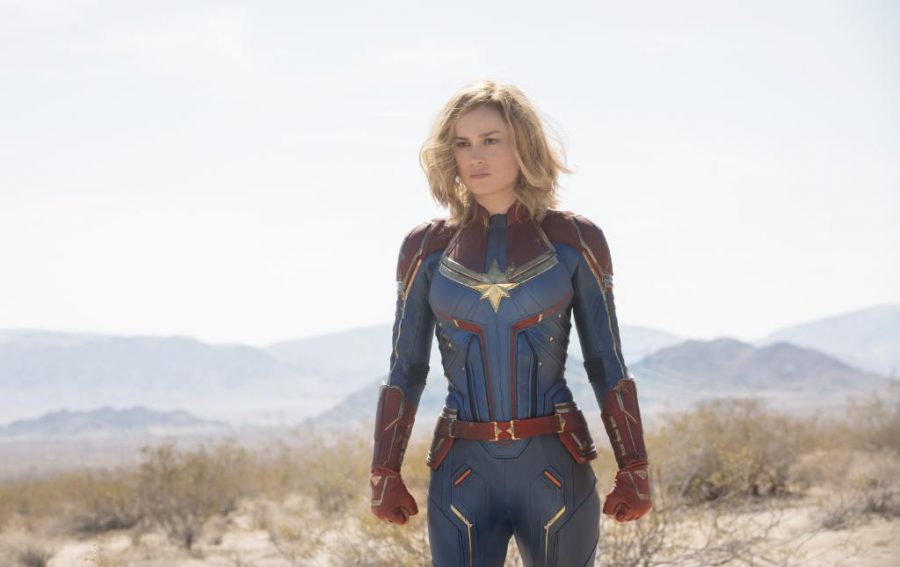Captain Marvel Pioneers New Wave of Female Heroes
The upcoming installment of the Marvel Cinematic Universe is a step toward a more diverse and inclusive film industry.
Captain Marvel portrayed as a woman.
October 3, 2018
Spoilers ahead! At the end of “Avengers: Infinity War,” fans left theaters feeling dejected and hopeless after seeing their favorite heroes dissipate before their eyes. But the film’s post-credits scene offered a light of hope as Captain Marvel’s symbol flashed across Nick Fury’s (Samuel L. Jackson) pager. Marvel fans’ glimmer of hope comes in the form of Carol Danvers, played by Brie Larson in “Captain Marvel,” set to be released March 2019. The film provides a triumph for fans who long to see heroines get the respect and recognition they deserve. Twelve days and 40 million views later, Marvel’s “Captain Marvel” trailer still lingers in the minds of avid superhero fans and feminists alike.
Danvers rising to the spectacular occasion of defeating Thanos — something her male counterparts were incapable of doing — is empowering. The male-dominated superhero genre is being shook to its core. Her standalone feature will be a testament to her ascension to Marvel royalty.
The trailer opens with a Blockbuster store, establishing a ’90s setting and eliciting a sense of nostalgia for a more recent past compared to the mid-World-War settings of “Wonder Woman” and “Captain America: The First Avenger.” Reminiscent of “Captain America: The First Avenger,” the “Captain Marvel” trailer offers a war-ridden backstory of Danvers as a fighter pilot. Fans can look forward to awesome fight scenes teased in the trailer and a closer look at Nick Fury’s backstory. The trailer has universal appeal, enticing both younger established fans and older fans drawn in by the time period. This is important because it allows fans of all ages to experience the sheer power of a female hero in an industry that hasn’t given actresses their fair share of leading roles.
Students at NYU look at “Captain Marvel” favorably, noting it as a step in the right direction toward a more inclusive and diverse Marvel Cinematic Universe and film industry in general. Tisch sophomore Laurel Lendesma looks forward to a changing future.
“Having a female-led movie will no longer be a big deal,” Lendesma said. “[I am] so excited to be part of the generation that pushes and promotes change and betters the industry for those that come after.”
Lendesma shares the sentiment that Captain Marvel will hopefully lead to more female-led blockbusters that showcase women of different races, ethnicities, sexualities and body types in starring roles.
NYU Film & TV Professor Christine Choy, having been in the industry for over 30 years, also feels auspicious about the development of films such as “Black Panther” and “Captain Marvel.”
“Times have changed a great deal, but it took a long long time,” Choy said. “The overall percentage of these [diverse] directors remains small in terms of overall production.”
Credit must be given to last year’s DC-produced blockbuster, “Wonder Woman.” It highlighted an equally strong female hero fighting in a time of war. Following both these heroines’ examples, Marvel will bring a larger array of female heroes to movies and television in the upcoming year. Released on Sept. 30 on Disney Channel, the new animated movie “Marvel Rising: Secret Warriors” features a ragtag group of superhero teens with diverse female characters, like Kamala Khan’s iteration of Ms. Marvel—Marvel’s first Middle Eastern hero—and America Chavez, a bisexual Hispanic hero. Spiderman’s girlfriend Gwen Stacy comes into her own as Spider-Gwen, who will also appear in “Spider-Man: Into the Spiderverse,” set to be released in December. Targeted at children, this new inclusive world of superheroes proves hopeful for the future of heroes of different identities. Also, reportedly when Disney’s own streaming service comes out, Elizabeth Olsen’s Scarlet Witch will be getting her own series.
Comic book fans, college students and feminists alike have been given hope—hope that it’ll only get better from here on out.
Email Julia Fields at [email protected].
























































































































































